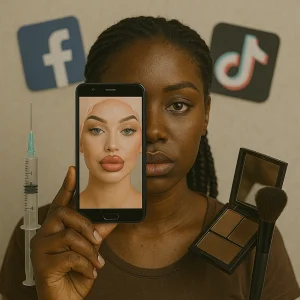
A Lagos student saves three months' allowance for a laser facial advertised by an Instagram influencer. A Nigerian nurse in the UK debates booking her third filler appointment, unsure if she's enhancing her self-esteem or erasing her origins. Across borders, a generation of Nigerians is caught in a global beauty vortex—chasing a flawless face that was never designed for them.
Looksmaxxing isn't just a trend here; it's a collision between aspiration and affordability, between global standards and local reality, and between a yearning to belong and the quiet grief of losing something rooted—like identity.
The Cost of Beauty in an unforgiving system
For many Nigerians at home, the consequences of cosmetic enhancement aren't just emotional—they can be life-threatening. There's no safety net if a procedure goes wrong. Clinics are often unregulated. Products lack approval. Aftercare? Nonexistent.
And yet, the pressure is mounting. Online, influencers flaunt porcelain skin and "snatched" jawlines without mentioning the cost or complications. In reality, even a skincare routine with imported serums costs more than most families' monthly food budget.
Abroad, A Different Mask But Still A Mask
For Nigerians abroad, especially in Europe or North America, the story shifts, but the core conflict remains. Sure, there's access to procedures. But often, there's also the pressure to conform, to tone down "Africanness" for acceptance.
UK-based student Temi puts it bluntly: "I'm dark-skinned, I have full lips, and I love it. But the algorithm doesn't. When I lighten my pics, I get more likes."
This isn't just cosmetic—survival in a space often rewards assimilation over authenticity. For diaspora youth, looking maxxing becomes not just an enhancement but camouflage.
The Gap Between What We See and What We Have
The real danger? The digital world makes it look close, like anything is possible. That serum, that jawline, that filter-perfect skin is one purchase away. But many young Nigerians have no money, a clinic, or a therapist to help when the pursuit collapses.
The emotional toll builds silently. Shame. Comparison. Desperation.
This gap - between global access and local reality—is where pain festers. It breeds quiet envy, risky shortcuts, or internalised hate. And often, no one talks about it, because the shame is personal.
Looksmaxxing is not merely about vanity; it's about belonging in a digital world designed elsewhere. Nigerians, especially Gen Z, are being shaped by standards that don't reflect their bodies, economy, or culture. And they're rarely offered tools to reconcile that gap. Our health system can't catch them when they fall. Our schools seldom teach digital self-worth. And our public conversations are still wrapped in silence.
To be young and Nigerian today is to straddle worlds—online and offline, home and abroad, fantasy and survival. The face in the mirror doesn't just reflect beauty—it demonstrates a battleground. Can we build a world where Nigerian youth feel beautiful without risking everything?




